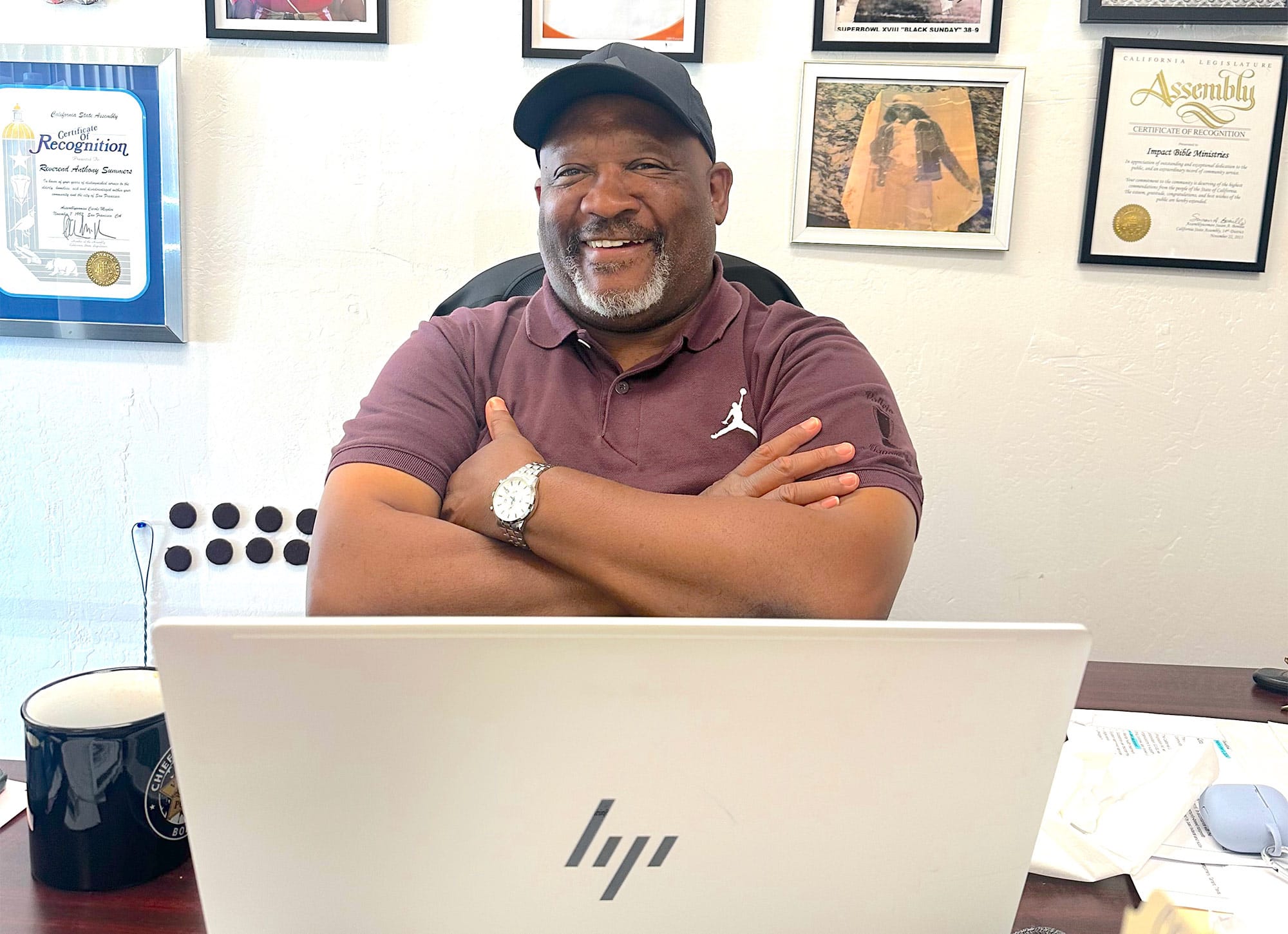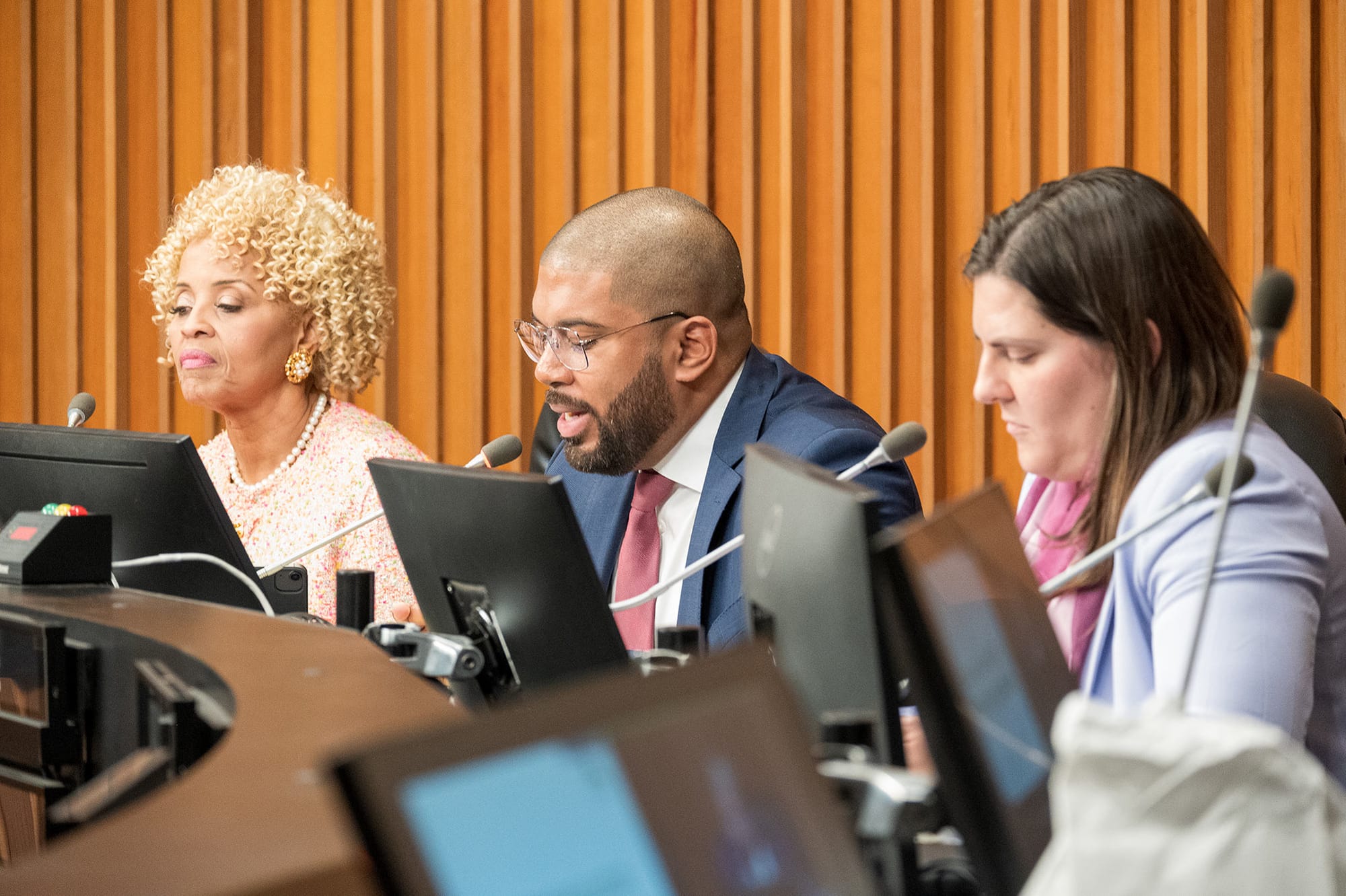VALLEJO – Healthy Vallejo was founded three short years ago to support youth in the Country Club Crest neighborhood, one of the most underserved and high crime areas in Vallejo. Today, with the help of city contracts, it employs 25 at-risk youth and is eying expansion.
“This youth employment and delinquency prevention program is making a healthy impact in Vallejo and in our lives,” said Pastor Anthony Summers, the organization’s founder and executive director.
Summers says this program is a vision that became manifest. In 2018 he made a first attempt to launch it as a medical clinic, but he ran into gridlock with the county and had to abandon the project.

After recovering from a bout of COVID-19 that almost killed him in early 2021, Summers said he heard God’s voice telling him, “Do it now,” and knew it was time to revive his dream. Between May and August of 2021 he fundraised $72,000 by calling on friends, neighbors, and everyone who would listen to launch his faith-based nonprofit.
The model he came up with was simple and effective: hire disadvantaged young people as interns and pay them for work that benefited the community.
From the beginning Healthy Vallejo specialized in city beautification projects. They started by cleaning the yards of seniors or people with disabilities who couldn’t do it themselves, at no cost to them.
Over time, they got contracts with the city manager’s office and the Police Department, which today provide about 30% of Healthy Vallejo’s annual budget. In exchange, the city tasks the organization with a stream of projects to clean up debris, overgrown vegetation, and trash in different neighborhoods.
Vallejo’s Code Enforcement Division also provides Healthy Vallejo with a list of code enforcement areas — homes that are fined for littering or unsightly front yards. From these various city sources, Healthy Vallejo has more than 60 clean-up projects in the pipeline.
The rest of the organization’s funding comes through grants and individual philanthropists. “Our current goal is $1.2 million in yearly income to employ 30 interns,” said Pastor William Coleman, Healthy Vallejo’s assistant director. “Anything over that opens up our capacity to bring in more interns.”
Their vision is to make Healthy Vallejo as big as they can and eventually expand it to other cities. They have already received inquiries from Los Angeles, Nebraska and Minnesota.
To recruit their first youth, they went door to door, posted fliers and visited high schools in the neighborhood. Today the program has 35 employees, 25 of them interns and 10 administrative, supervisory and marketing staff. New interns come through word of mouth and from different neighborhoods. The organization has a waiting list.
The youth in the program have experienced enormous hardships: human trafficking, drug-addicted parents, drive-by shootings, constant evictions, and extreme poverty. Participating in Healthy Vallejo brings them income, discipline, and hope.
A young woman was so traumatized by the violent death of her two best friends that she became a recluse in her own home and unable to speak. She regained her confidence after joining the organization. “We were able to cultivate this effervescent side of her,” Summers said, “and she became one of our emcees for the last two fundraisers and talked in front of over 100 people. Her mother wept, because at one point she thought her daughter would never speak again.”
The program not only impacts the youth but also their families. “Some of these young people are helping their parents pay their rent and bring food in the house,” Coleman said, “so being able to support them through employment is critical.”
Healthy Vallejo also partners with businesses and organizations who need employees but can’t afford them. They have worked with Cal Fire on fire prevention projects and have a janitorial contract with Elite Public Schools. They hope that more business owners will get onboard and eventually will be able to afford hiring the interns directly.
“I quote Father Gregory Boyle a lot,” Summers said, referring to the founder of Homeboy Industries, the world’s largest gang intervention and rehabilitation program: “‘Nothing beats a bullet like a job.’”
The youths’ ages range from 16 to 24 years old. Kids under 18 can only work 15 hours a week, so they come for four hours on Wednesday afternoon and the whole day on Saturday. The older kids work four hours a day.
Aside from committing to their job schedule, all interns have four mandatory hours of class on Saturdays. Their main focus is financial literacy, which Coleman teaches. “Poverty is cyclical,” Coleman said. “We learn the habits of how to be poor, no matter how much money we make, if we are not educated out of those habits. I want to give the interns every single tool they need to be able to rehab themselves out of poverty.”
The classes are comprehensive and build from one year to the next. Coleman starts by introducing core skills like creating an emergency fund, spending plans, budgeting plans and saving plans. “Now about 60% of the interns have an emergency fund,” he said, “and all of them have the tools they need to create a sustainable budget for themselves.”
Then he moves on to more complex topics, such as opening a Roth IRA, investing in the stock market, and fundamental analysis of various companies. The youth learn about return on equity, the debt of the company, the book value, and buy and hold, among other things. Next, he plans to teach them about real estate investments.
“Their enthusiasm about this new financial language is changing their lives,” Coleman said. “It’s a discipline to handle money properly, and that discipline is going to show up at home, at school, with family, and with friends.”
Achieving the organization’s goals is not easy, especially when it has so many needs. First and foremost, they need consistent funding and donations, but they are also in great need of specific supplies: tools like weed eaters, shovels, rakes, and heavy duty trash bags, gas for their vehicles, and food — many of the interns don’t have enough food at home, so feeding them is a crucial part of the program.
“To have some of those costs covered would allow us to bring in another young person and give them a chance,” Coleman said. They would also love to find a volunteer who knows about graphic design, website development and computer networking.
The steady paid work, classes, and loving discipline allow Healthy Vallejo to do what Summers called a soft handoff: giving the interns skills that set them in the right course for life, either by finding a stable job, a vocational path, or going to college. They have achieved such a soft handoff with a few interns already, with two attending college at Albany State University and another at Sacramento State University.
“There are young people who need hope everywhere,” Summers said. “We are determined to give them a chance in life.”
Before you go...
It’s expensive to produce the kind of high-quality journalism we do at the Vallejo Sun. And we rely on reader support so we can keep publishing.
If you enjoy our regular beat reporting, in-depth investigations, and deep-dive podcast episodes, chip in so we can keep doing this work and bringing you the journalism you rely on.
Click here to become a sustaining member of our newsroom.
THE VALLEJO SUN NEWSLETTER
Investigative reporting, regular updates, events and more

Isidra Mencos
Isidra Mencos, Ph.D. is the author of Promenade of Desire—A Barcelona Memoir. Her work has been published in WIRED, Chicago Quarterly Review and more. She reports on Vallejo's businesses and culture.
follow me :




